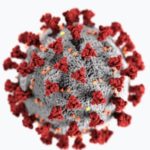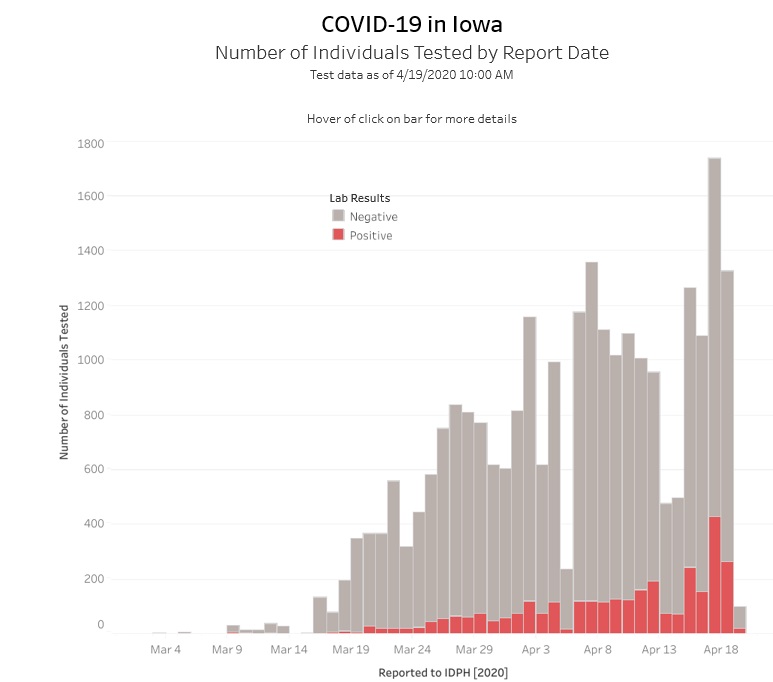 The impact of COVID-19 in the meat packing industry was on Governor Kim Reynolds’ mind, and the minds of journalists, at her daily COVID press briefing Monday.
The impact of COVID-19 in the meat packing industry was on Governor Kim Reynolds’ mind, and the minds of journalists, at her daily COVID press briefing Monday.
The governor began as she always does, reciting the number of new cases, negative tests, deaths, and the capacity of Iowa hospitals to handle more patients. During the 24 hours preceding Sunday at 10 am, the Iowa Department of Public Health reported 257 new positive cases, putting the total for Iowa at 3,159 cases.
The total number of new cases over the previous two days is 646. According to Reynolds, of the 389 new cases reported Sunday, 261 – 67 percent – can be attributed to surveillance testing in meat processing facilities, primarily at Iowa Premium National Beef in Tama County and at the Tyson plant in Columbus Junction.
Surveillance testing includes persons who don’t exhibit any symptoms of the disease. Epidemiologists have learned some people can have COVID-19 without feeling ill. Those people can, however, infect others.
Reynolds said COVID-19 spreads quickly when people are in close proximity to each other, as in packing plants, “but these also are essential businesses and an essential workforce. Without them, peoples’ lives and our food supply will be impacted.”
“We must do our part to keep them open in a safe and responsible way,” Reynolds said.
The IDPH is working with meat processing plants and will send strike teams to conduct more testing, contact tracing, or develop plans for partial staffing.
IDPH deputy director Sarah Reisetter said businesses have been asked to report when 10 percent or more of their workforce is absent from work or an employee is confirmed to have COVID-19. That includes meatpacking plants, food and beverage processing plants, and factories with production lines. When that happens, IDPH will provide guidance on decreasing workplace spread and possibly do surveillance testing. There will also be help with contact tracing.
Reisetter said IDPH has added staff, some of whom are bilingual, to do contact tracing.
Strike teams will also assist long term care facilities. There are currently 10 LTC facilities with outbreaks (three or more residents or staff).
During the Q & A, Reynolds said she has talked with management staff at all Iowa meat packing plants to be sure they’re aware of ways IDPH can assist. “These processing plants are essential, and these workers are essential workforce. We have to be doing everything we can, collectively. We should all be working on finding solutions, to making sure we’re doing infection control policy, that we’re making sure that the workforce is protected, and most importantly, that we’re keeping that food supply chain moving,” Reynolds said.
She was asked if she’d send the National Guard to plants for cleaning measures, or if she’d consider ordering plants to close for cleaning. Reynolds answered with a long list of mitigation efforts the plants have put in place. She said the National Guard could be used to transport testing materials to and from plants, or to help with contact tracing.”
She said she or IDPH will stay in contact with the plants about ways to keep running with less than full capacity, perhaps as sparse as having only 50 percent of the workforce available. “It’s important. It isn’t like a regular facility you can shut down for two weeks,” Reynolds said. “We have farmers raising hogs. We’re the largest hog producer in the country. We provide a third of the nation’s pork supply. If we aren’t able to move them (hogs) through the process, at some point we’re going to have to be talking about euthanizing hogs. We’re not that far from it. It would be devastating, not only for the food supply, but for the cost of food going forward.”
Reynolds also reported that on Sunday an inmate at the Iowa Department of Corrections Iowa Medical Classification Center (IMCC, Oakdale) tested positive. It is the first positive case in any of Iowa’s correctional facilities.
There are also two staff members who tested positive. Only 127 tests have been done.
There are 10 positive cases among persons under supervision in community-based corrections (CBC), along with four staff members.

Iowa Department of Corrections director Beth Skinner highlighted mitigation efforts already taken.
The DOC has taken steps to avoid spread of the virus, in part by reducing the prison population. County law enforcement has been asked to suspend admissions to the IMCC and probation revocations.
Skinner said that a month ago Iowa’s prisons were at 22 percent above capacity. As of April 20, the prison count is 8,372, the lowest count since June 30, 2017. Since March 1, there have been 811 releases and 748 admissions. “We’re working closely with the Board of Parole, which has the authority to release those that would likely succeed in a community setting. Together, our agencies are working to find a balance of good public safety and safety of our institutions for our staff and those incarcerated,” Skinner said.
She said another 482 inmates have been approved for release once safe, sustainable housing is available for them in communities.
She tallied the personal protective equipment (PPE) Iowa Prison Industries has manufactured for use during the pandemic. Inmates have made 62,378 face masks, 6,305 face shields, 7,661 washable gowns, and 16,060 gallons of hand sanitizer. She brought examples along for Reynolds to show.
The 250 active duty Iowa National Guard soldiers and airmen serving fulltime to support the state’s COVID-19 mitigation efforts have been moved to fulltime federal duty status. Their work hasn’t changed, but they’re now federally funded.
Four additional deaths were reported in the 24 hours before April 19 at 10 am. An adult age 41-60 died in Black Hawk, Linn and Mahaska counties, and an adult 81 or older died in Linn County.
Complete data is available at coronavirus.iowa.gov. Select “Current Status.”
